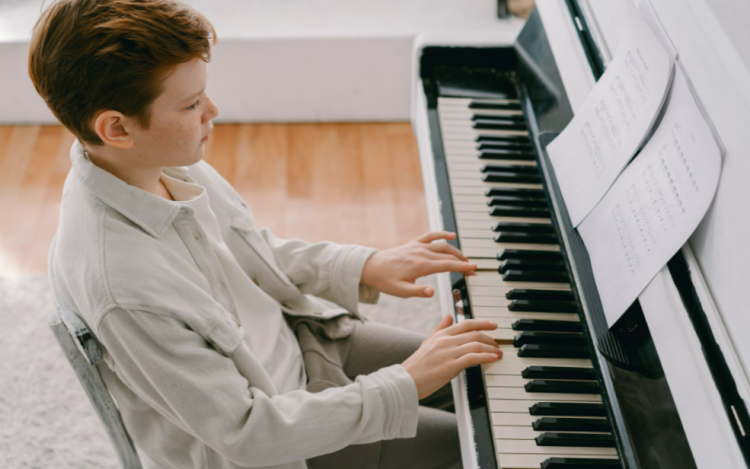Learning to play piano is an excellent introduction to music, and it’s also a great way for your child to learn life lessons they can use in other endeavors. Your child can expect challenges and chances for growth from learning to play a musical instrument that parallels life’s trials and opportunities. Here are some important lessons you can help your child learn by enrolling them in piano lessons.
Following Directions
When a child begins piano classes, it may be the first time they have taken directions from anyone other than a parent or schoolteacher. Following directions helps children learn respect for authority figures and helps them gain an understanding of chosen roles in learning situations. In return, a good music teacher shows students respect by offering encouragement and avoiding judgment.
Perseverance
Piano lessons require concentration and a willingness to learn even when there are setbacks. As your child learns perseverance through piano lessons, they begin to see the benefits of following through on actions. A child that sticks with their music instruction is rewarded by learning to play the instrument well and learning that sometimes all you need to do to succeed is keep trying. That satisfaction and personal pride after they’ve mastered a difficult piece can also serve as motivation as they move on to new songs.
Acceptance of Failure
Everyone who plays the piano makes mistakes every time they sit down to play. Other avenues of life involve frequent mistakes too. Taking music lessons can teach your child that practice means fewer mistakes while helping them understand that mistakes aren’t the end of the world. They also learn that the reward for completing a task is even more meaningful when they have made failed attempts.
Logical Thinking
Logic is defined as reasoning according to established principles. While music is an art, it’s also logical and can be examined mathematically. Notes and measures have defined lengths, keystrokes have definite outcomes, and simple combinations form the basis of complex musical patterns. As your child learns how to form chords, for example, they’re beginning to understand how logic can explain and predict an action’s outcome.
Patience
Perhaps above all, learning piano takes patience. In music class, you must be patient with your learning abilities, the teacher’s quirks, and perhaps other students. No lesson in life is more valuable than learning to patiently accept and tolerate whatever comes your way.
Piano lessons are a wonderful way to expand your mind, build soft skills, and find a new hobby your children can enjoy. However, these days, many kids are nearly as busy as adults. This means that simply finding the time to practice and improve their piano skills can be the biggest challenge to taking up this new pastime. However, there are plenty of ways to help your child fit this into their schedule.
Opt for Short Practices
Does your child not have an hour every day to dedicate to practice time? Then use several smaller chunks of time instead. If they can practice for 10 or 15 minutes multiple times a day, they achieve the same results. In fact, you may even find that this method of breaking up the time actually helps them learn better and faster. Have them set a short goal, such as practicing one piece or doing one section of repetition several times during each session.
Use a Phone
Look for apps that help with various aspects of learning music and learning an instrument. There are apps that help learn finger movements that aid in learning to read music and that help you get faster in following sheet music.
You can let them practice using these apps while waiting—such as before appointments or during downtime—or while commuting to school. Rather than wasting time on silly games or social media, have them spend some time enjoying a little informal practice
Listen to Others
Have a long daily commute? Make use of the time by listening to music of all skill levels. You can have them listen to piano music in the car on the way to or from school and other activities. As they grow in their piano skills, they can pick up the different tempos, musical styles, and composers. If they develop an interest in a particular genre or style of music, let them listen to more of that type. In addition to downtime while commuting, play piano pieces as background music while they are studying.
You can record their practice sessions or ask their teacher to record some sessions to work on understanding particular pieces. They can work on specific skills like tones and accuracy by listening to their own work and the work of others.
Learning the piano in modern times is much different than the old days when people sat strictly at the keyboard for hours on end. Today, your kids can use apps, short breaks, and recordings to work on their art no matter where they are or how busy they are. With these tips, they can achieve their goal of learning to play the piano.
When your child follows their piano teacher’s instructions, stays with their lessons, and accepts that they will make mistakes, they can gain important logical thinking skills and crucial patience that will serve them throughout life. Those are great bonuses that go along with learning to make beautiful music.




